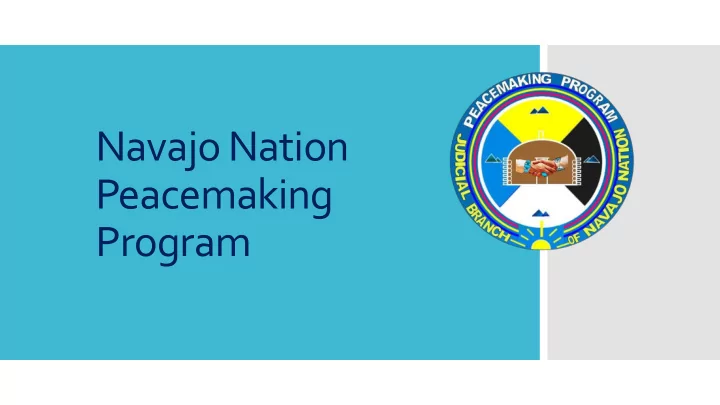

Navajo Nation Peacemaking Program
Since time immemorial, Diné have been unified as a People by strong traditions. K’e Bee Our traditions are based on teachings Hózh ǭǭ that were given to us so that we could live in harmony with our world, our N1hoodlee[ fellow Diné, our Clans and families, and ourselves — so that we can Walk in Beauty.
The Judicial Branch is made up of courts, and judges who apply statutory law to determine winners, losers, guilt and innocence. This is an Anglo-based approach to law. Navajo Nation Judicial Branch If we are to have both legal and cultural sovereignty, Diné must also have culturally-based justice. That is the role of Peacemaking.
Based on our traditional teachings, disputes have been resolved by K ’ e Bee bringing all the affected people together, and with the help of a Hózh ǭǭ respected elder or leader, talking it out N1hoodlee[ to decide for themselves what “justice” means.
The core mission of the Peacemaking Program is to implement Navajo culture through the facilitation of traditional justice practices. K’e Bee This requires that Peacemaking also: Hózh ǭǭ Inform through outreach N1hoodlee[ Educate through curriculum and mentoring Provide Expertise for the Judicial Branch and the Navajo Nation Contribute Navajo traditional approaches to negotiations and policy development.
Peacemaking Program Priorities: 1. Inclusive of all Faiths 2. Children & Family Hózh̨̨̩̩ ó Priorities of the 3. Status and Respect Accorded to Elders Peacemaking 4. Protection of Vulnerable Adults Program 5. Extreme Family Discord 6. Restorative Justice
Navajo Youth US Average Issue Programs Thoughts of 17% 21.8% suicide (2014) for Youth Attempted 10.4% 8% suicide (2014) Child Navajo Youth 18.3% 9.2% Maltreatment are Suffering 25% 9% Sexual Violence
Our highest responsibility as Diné is the care, protection, and nurturing of our children. When our children struggle and stumble, Programs they are showing us that we are not meeting for our responsibilities. Youth When our children suffer, our Nation suffers. They are sacred, and our future.
We know that youth who: Are educated in and about their culture and Connected to their family and community; Have self-identity based on their heritage; Programs Receive culturally-relevant education; and for Experience culturally-based behavior Youth expectations and correction Commit fewer crimes Stay in school and graduate at higher rates Have higher life satisfaction and self-esteem
The Peacemaking Program offers programs for youth that are designed to: Provide traditional cultural education Teach culturally-based behavioral Programs expectations for Develop conflict resolution skills to avoid Youth youth violence Create strong mentoring relationships with caring adults Help troubled youth stay in school
1. More youth engagement, education and mentoring 2. Family stability and re-unification services Peacemaking 3. Prisoner re-entry services Program 4. Policy development contributions, such as Diné Action Plan for Suicide, Violence, and Addiction 5. Sharing resources with other agencies, such as Goals and staff and client training in traditional cultural topics, Strategic and joint case management Initiatives 6. Greater resource to Courts and Community to provide traditional pathway for dispute resolution 7. Support Navajo Nation with traditional approach in inter-agency and other negotiations
Recommend
More recommend